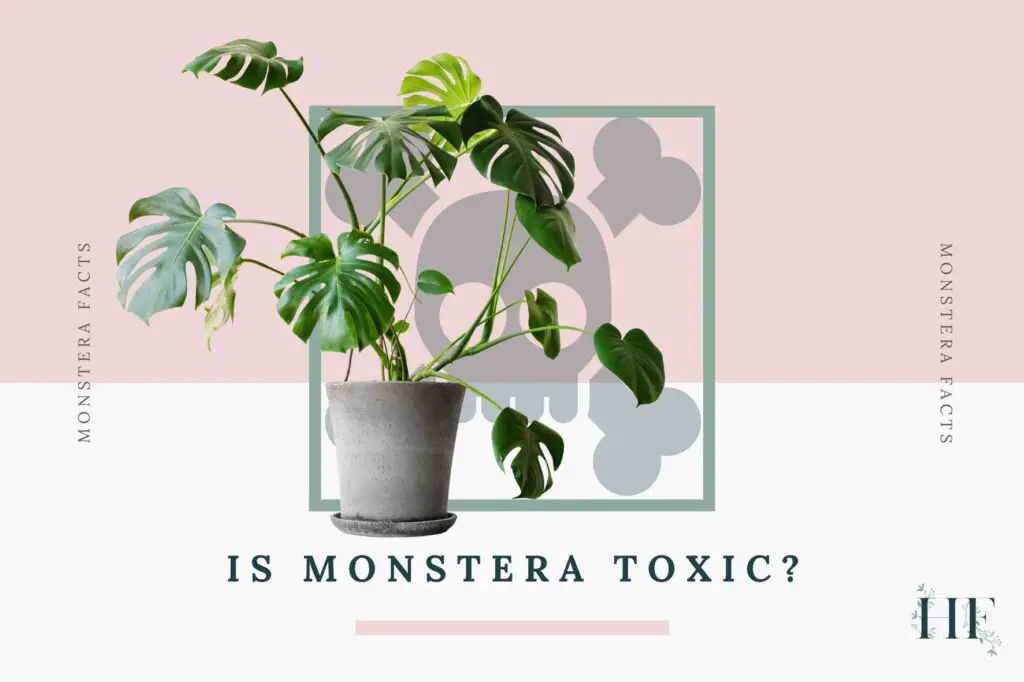For houseplant lovers who are also pet owners and/or parents, making sure that your plants are compatible with the rest of the family requires a bit of research.
Since most types of pets are known to take the occasional bite out of our plants, and toddlers love grabbing everything handy, it’s a must-know for plants that are toxic.
So, how about the popular Swiss cheese plant? Is Monstera toxic to pets and humans?
Is Monstera Toxic?
Across all the 45 species of Monstera, all parts of the Monstera plant, i.e., leaves, fruits, stems, roots, or flowers, are toxic or poisonous because they have insoluble oxalate crystals.
The only exception is the fully ripened Monstera Deliciosa fruits, which are edible for humans.
Besides Monstera, most of the houseplants from the Araceae family also have insoluble calcium oxalate crystals.
The severity of the symptoms varies from one plant to another because the concentration of these crystals varies.
In terms of plant toxicity levels, Monstera Deliciosa is labelled as 3 or 4 out of 4 (source).
| Plant Name | Toxicity Level |
|---|---|
| Monstera Deliciosa (Swiss cheese plant) | 3 or 4 |
| Dieffenbachia spp. (Dumb cane) | 3 |
| Aglaonema (Chinese evergreen) | 3 or 4 |
| Spathiphyllum spp. (Peace lily) | 3 or 4 |
| Calla lily (Zantedeschia aethiopica) | 3 or 4 |
| Philodendron spp. (Heart leaf) | 3 or 4 |
| Alocasia spp. (Elephant’s ear) | 3 or 4 |
| Anthurium spp. (Flamingo Flower) | 3 or 4 |
| Caladium bicolour | 3 or 4 |
| Epipremnum aureum (Pothos) | 3 or 4 |
Here’s a breakdown of the toxicity class and what to do:
- Level 1 – Major Toxicity: These plants may cause serious illness or death. If ingested, immediately call the Poison Control Center or your doctor.
- Level 2 – Minor Toxicity: Ingestion of these plants may cause minor illnesses such as vomiting or diarrhoea. If ingested, call the Poison Control Center or your doctor.
- Level 3 – Oxalates: The juice or sap of these plants contains oxalate crystals. These needle-shaped crystals can irritate the skin, mouth, tongue, and throat, resulting in throat swelling, breathing difficulties, burning pain, and stomach upset. Call the Poison Control Center or your doctor if any of these symptoms appear following ingestion of plants.
- Level 4 – Dermatitis: The juice, sap, or thorns of these plants may cause a skin rash or irritation. Wash the affected area of the skin with soap and water as soon as possible after contact. The rashes may be very serious and painful. Call the Poison Control Center or your doctor if symptoms appear following contact with the plants.
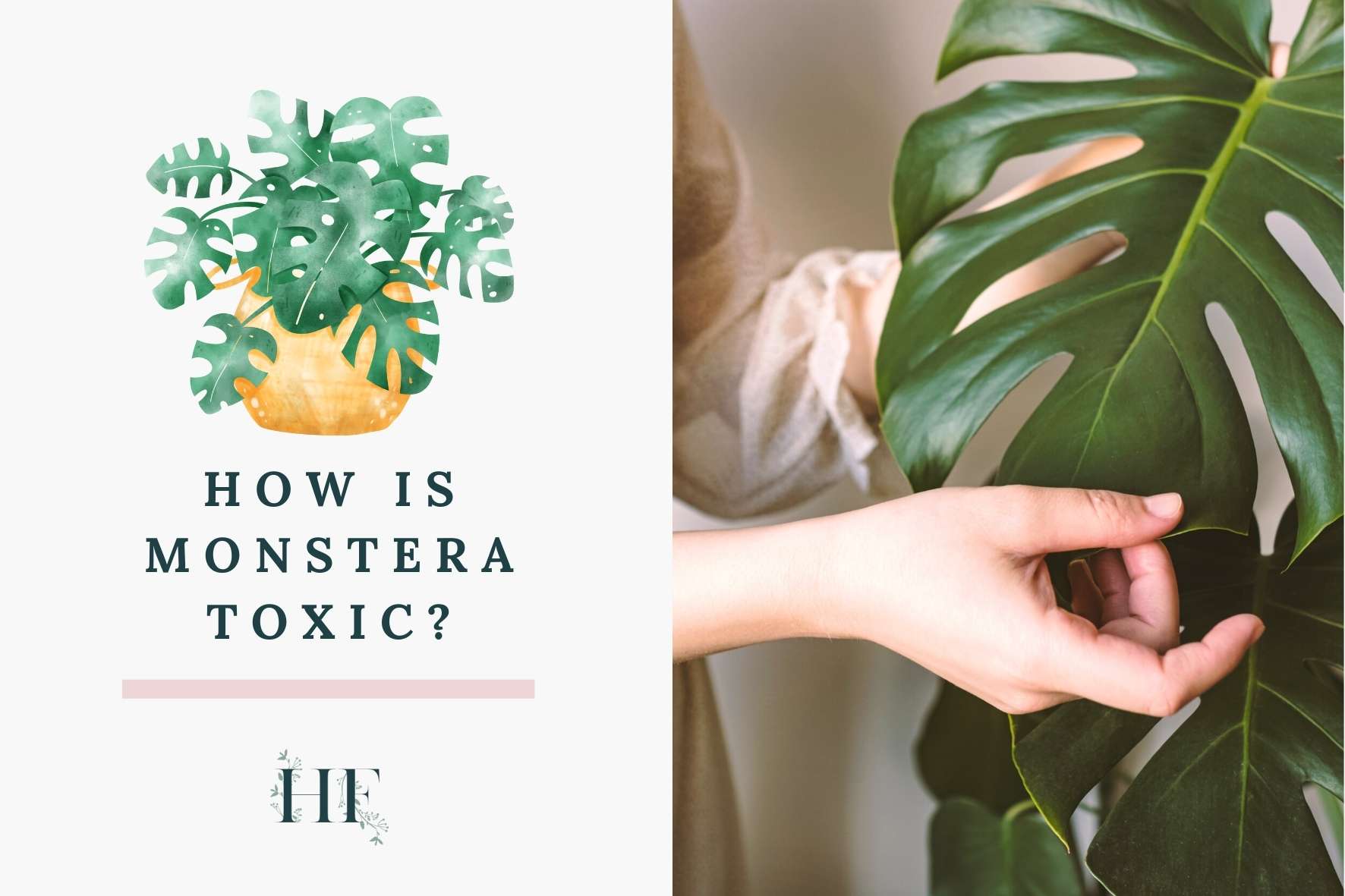
How Is Monstera Toxic?
Monstera is poisonous, but what effect do they cause? Are they toxic to humans too?
Which Part of Monstera is Toxic?
As mentioned above, all parts of the Monstera plant are toxic to humans because they have insoluble oxalate crystals (which are also what cause kidney stones). These parts include leaves, stems, roots, flowers and fruits.
Calcium oxalate crystals are highly irritating, especially to the mouth and even the stomach when ingested. The only exception is Monstera Deliciosa fruits, which are edible for humans when fully ripe.
Are Monsteras Toxic to Touch?
While they won’t irritate your hands, Monstera can irritate your lips, mouth, or tongue if you touch them after touching the plant, causing irritation or stinging. Wearing gloves or washing your hands after handling these plants can help prevent a reaction.
Also, the juice from Monstera can cause mild skin irritation or contact dermatitis. So, always wear gloves when handling this plant.
Are All Monsteras Toxic?
The 45 species of Monstera are considered toxic. Meaning even Monstera Adansonii or Monstera Deliciosa (known as the Swiss cheese plant) are toxic.
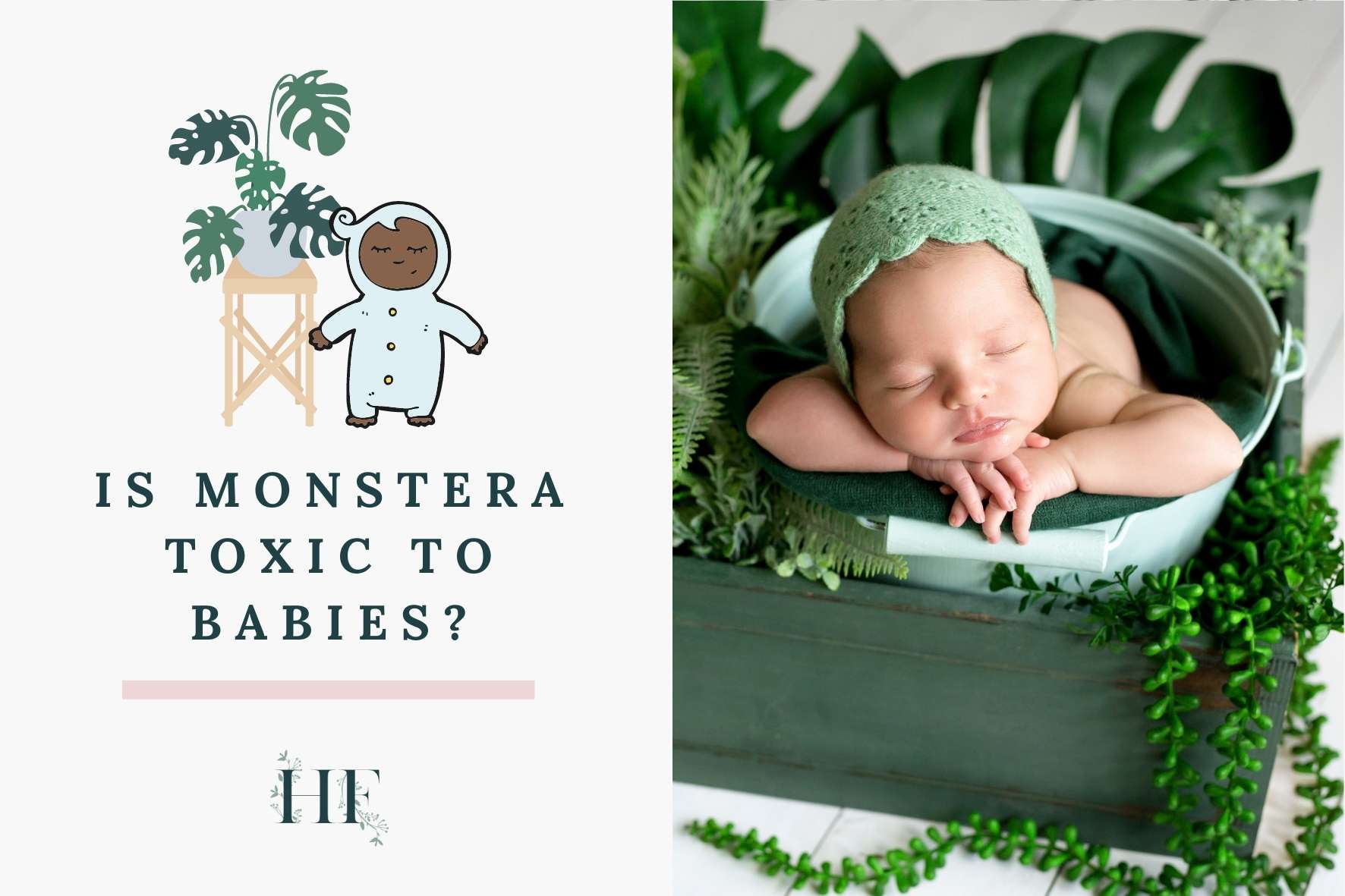
Is Monstera Toxic to Babies?
Also because of its sharp insoluble oxalate crystals, Monsteras are also toxic to babies. It’s best to keep your Monstera plant out of reach or gift it away.
When ingested, here are the signs to expect:
- Oral irritation and burning sensation.
- Swollen and mouth lips or tongue.
- Drooling.
- Reduced appetite.
- Difficulties in swallowing.
- Hard to speak and swelled throat.
If your kid eats a Monstera and has any of the symptoms above, call the Poison Control Center at +1 (800) 222-1222 for further help.
Is Monstera Toxic to Pets?
According to the ASPCA, the genus Monstera is toxic to cats, dogs, and other pets because they have insoluble oxalate crystals. These calcium oxalate crystals are created inside the plant’s cells and can be needle-shaped (called raphids).
When chewed or ingested, Monstera will embed on mucous causing severe irritation, and a burning feeling on lips, tongue, mouth, or throat.
Note, even if Monstera Deliciosa fruits are edible when fully riped, don’t give them to your cat or dog as they may not be the healthiest choice.
Signs of Monstera Plants Toxicity
If your cat or dog chews Monstera, here are the signs of monstera plant toxicity to keep an eye out for (source):
- Oral irritation.
- Intense burning and irritation of mouth, tongue and lips.
- Excessive drooling.
- Vomiting.
- Difficulty swallowing.
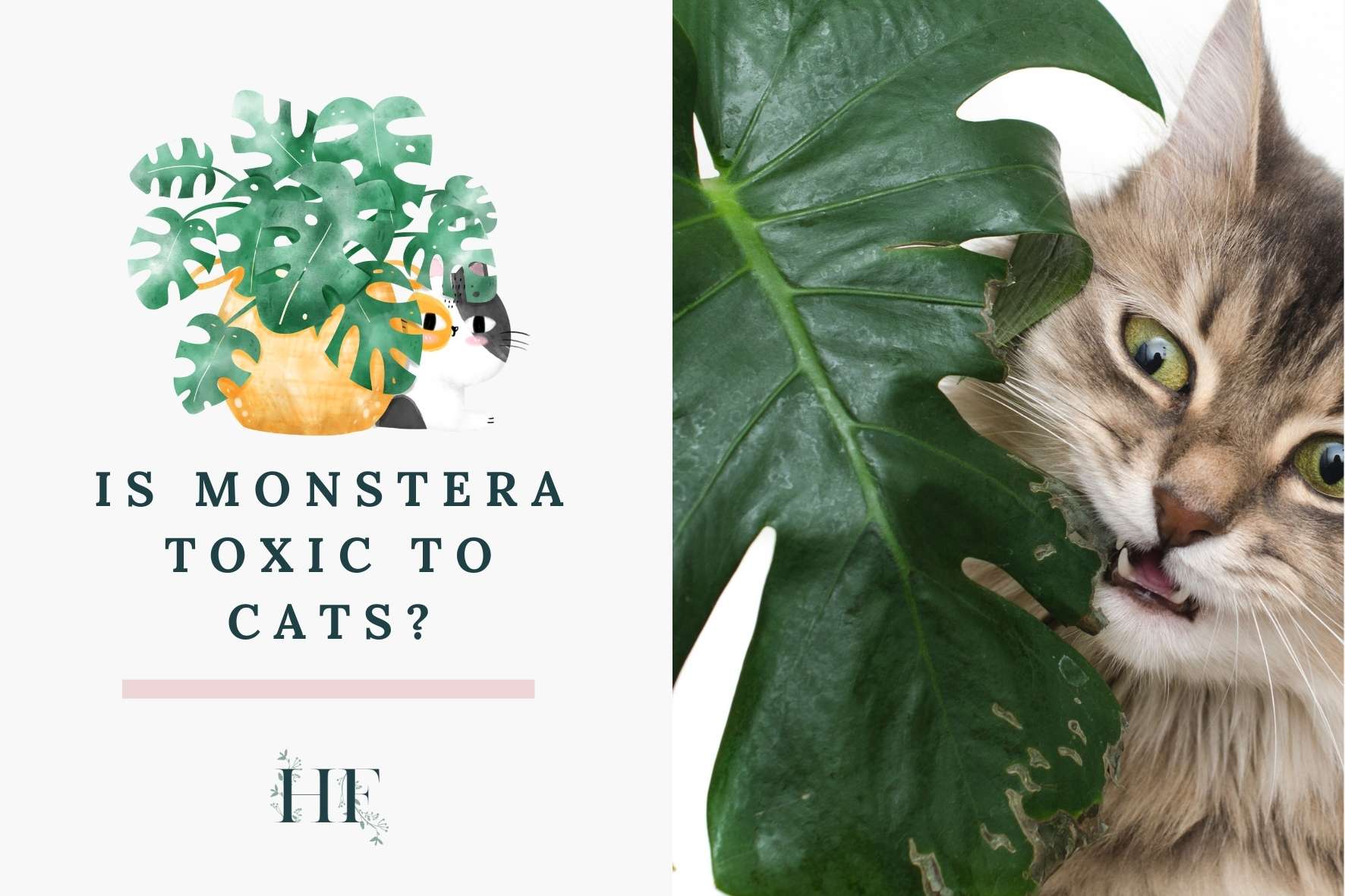
Is Monstera Toxic to Cats?
Although its toxicity is not major, Monstera is still toxic to cats since it causes irritation when ingested.
So if your cat ate a Monstera leaf or stem, check for any of the symptoms mentioned above. If you notice them, call your veterinarian or the Animal Poison Control Center at +1 (888) 426-4435. Also, you can call the Pet Poison Helpline at +1 (855) 764-7661.
Insider Tip: You can rinse their mounth with water to aliviate any irritation, make sure that they don’t swallow the water. This remedy also applies to other pets and even kids!
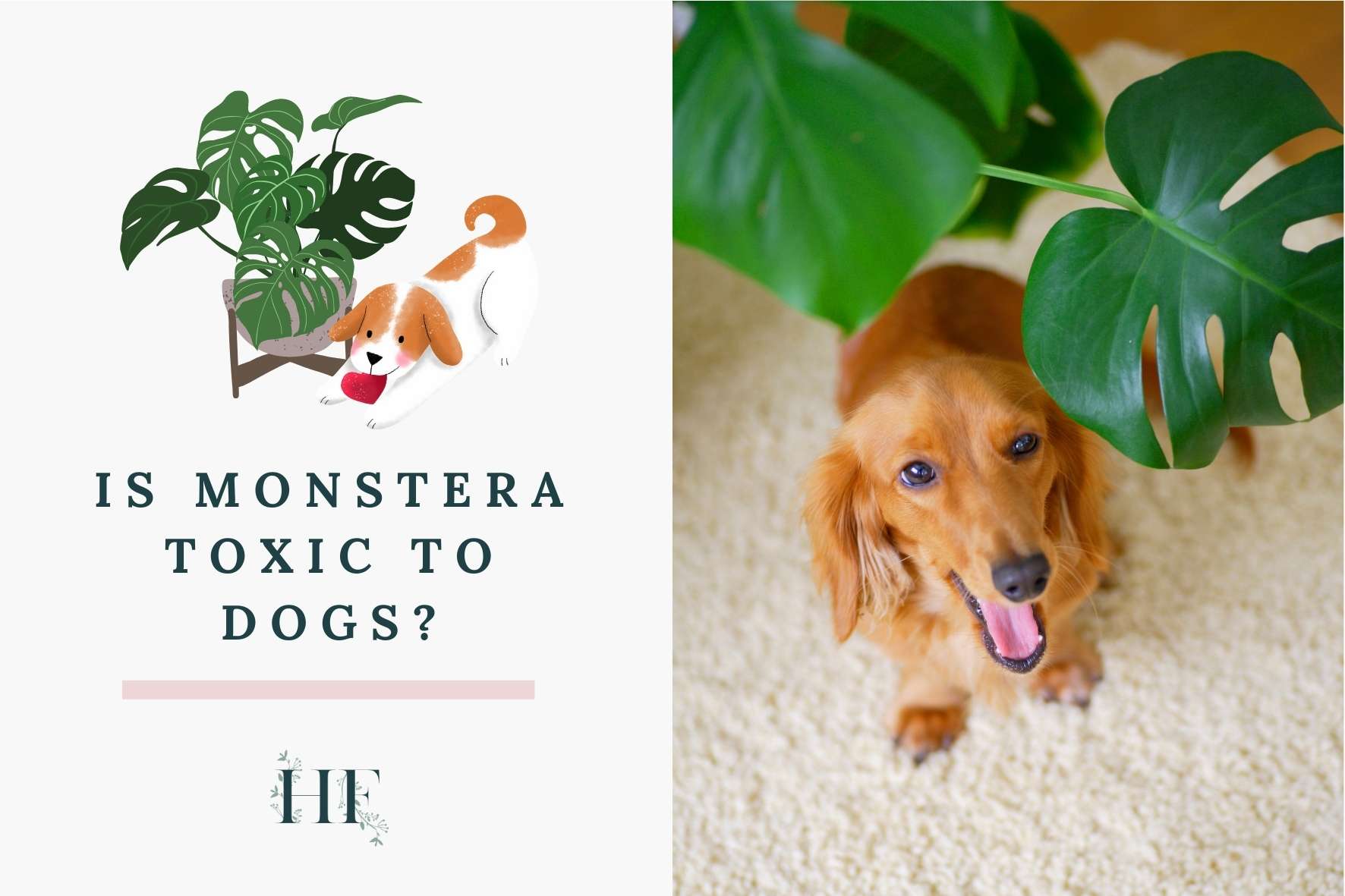
Is Monstera Toxic to Dogs?
Monstera is toxic to dogs due to the insoluble oxalate crystals that the plant has.
What if my dog eats Monstera?
If you suspect your dog ate Monstera leaves or stems, check for any of the symptoms we have given you above. If you notice them, call your veterinarian or the Animal Poison Control Center at +1 (888) 426-4435. Also, you can call the Pet Poison Helpline at +1 (855) 764-7661.
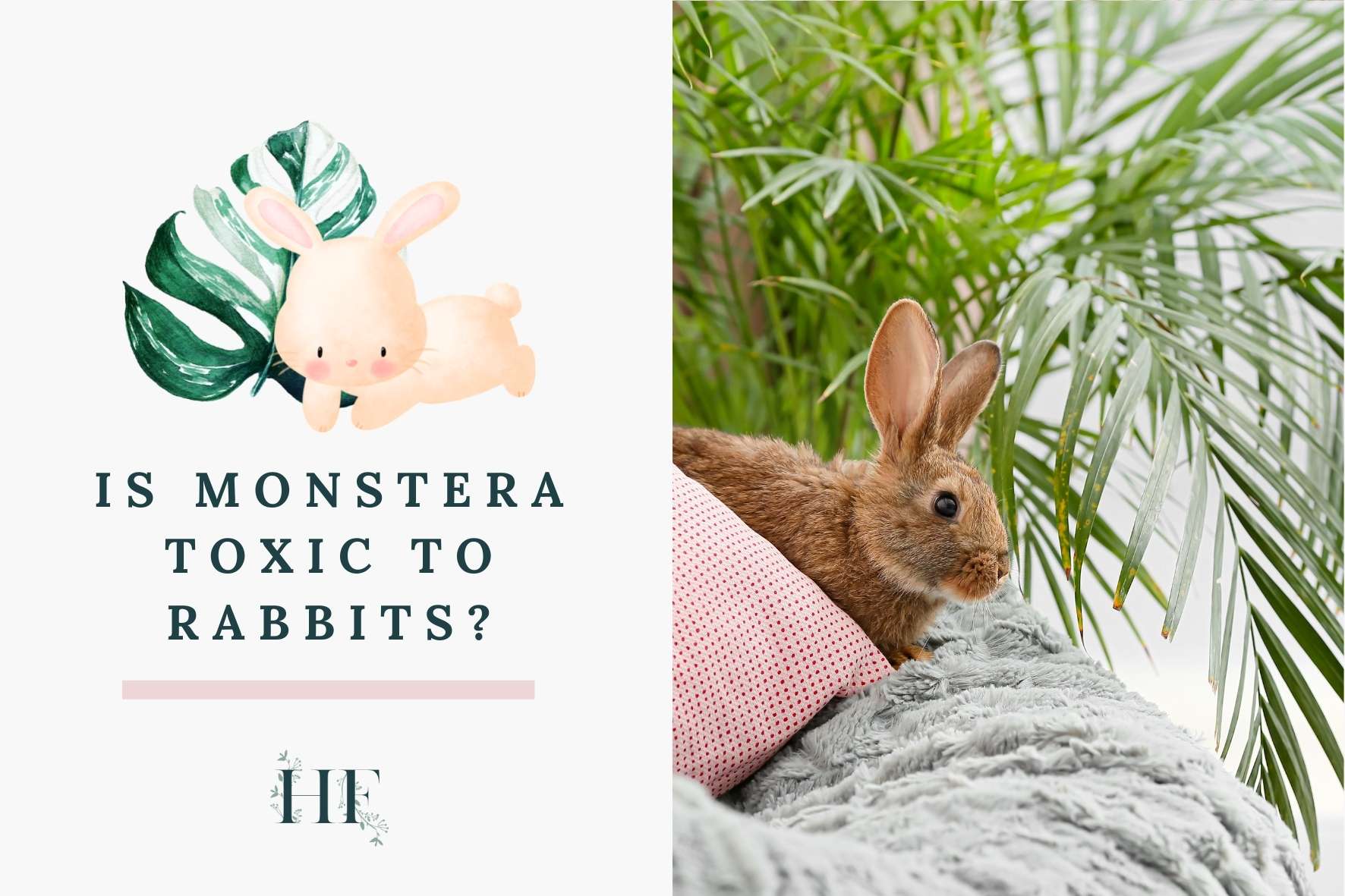
Is Monstera Toxic to Rabbits?
Rabbits are not immune either.
Monstera is toxic to rabbits. The difference here is that apparently rabbits either don’t get the stinging sensation, OR that Monstera tastes good enough for them to ignore the stinging sensation, OR that they like the stinging sensation.
What I have gathered from rabbit owners is that they will actively SEEK OUT the Monstera plants and try to eat them! If you catch your bunny red-handed and are concerned, call your veterinarian or the Animal Poison Control Center at +1 (888) 426-4435.
Monstera Safety Tips
It’s safer to keep your Monstera out of reach from your pets and kids to avoid any problems. Both pets and kids are naturally curious, so it’s not just that your plant may become victim to this curiosity, but also that your kids or pets may be in harm’s way.
Haven said that, even if your Monstera gets chewed upon, it will be absolutely fine. Although unfortunately, the damaged foliage won’t recover; feel free to prune it if you don’t like how it looks.
Keeping Pets Away from Your Monstera
Here are some ideas to keep your Monstera plant out of reach, especially if your pet is a chewer:
- You can place a physical barrier between your pet and the plant, like chicken wire.
- A plant cabinet or shelf is a good idea because it creates a beautiful out of reach display. If you have a cat, placing the pots together so she doesn’t have a space to land helps.
You can find out more about pet and plant safety at How to Make Your Home Dog-Friendly and How to Make Your Garden Dog-Friendly blog posts that I wrote at Cuddla.com (my dog blog).
Childproofing Your Plants
You can prevent all access to your plant collection until your child is old enough to understand the dangers and resist the temptation.
Here are some ways to babyproof your plants:
- Tall plant stands. Make sure that they are secure so they can’t pull them down onto themselves.
- Countertops, unless it’s a hanging plant.
- High shelves.
For Monsteras, you can even keep the leaves up by training your plant with a moss pole or trellis.
Once your kids get older, you can teach them proper Monstera care. This will help them understand that plants are not toys or food and that they can be harmful when handled incorrectly.
Share in the comments any stories and tips regarding your monstera and the other family members.

